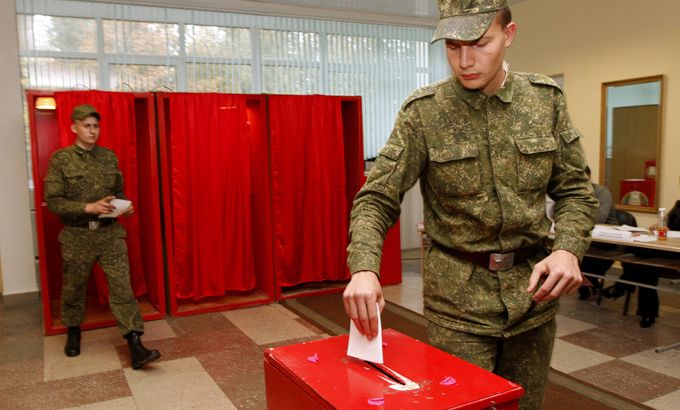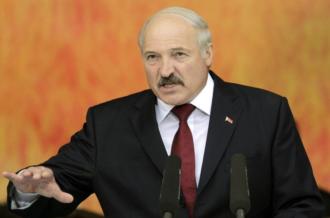Polls close in Belarus election amid boycott
Opposition, alleging fraud, advised citizens to avoid voting in bid to deny parliamentary polls claim to legitimacy.

Parliamentary elections in Belarus have ended without the country’s main opposition parties taking part, following calls for a boycott on grounds of irregularities and illegal detentions.
Poll closed at 8pm local time (17:00 GMT) having opened 12 hours earlier.
The news comes as the Central Election Commission declared the parliamentary vote valid with a turnout of at least 65.9 per cent, while independent monitors have suggested a far lower turnout at 30 per cent.
The main opposition parties said official claims that turnout was 65.9 percent even before polls closed were wildly out of step with reality.
“The election commission is unscrupulously lying as these figures are so radically different from those of observers,” Vitaly Rymashevsky, co-chairman of the Belarus Christian Democracy party, told the AFP news agency.
The election must fill 110 seats in the Belarusian parliament, which has long been seen as a rubber-stamp body for President Alexander Lukashenko.
On Sunday, Lidya Yermoshina, the head of the election commission, said that it results had been finalised for 109 seats, and that it was “doubtful” that the opposition had won any seats.
As the authorities under President Lukashenko have no formal ruling party and the new MPs are listed only by surname and not political affiliation it will take some time to interpret the results.
|
“The opposition is virtually broken. It has few resources and there is no real programme“ – Alexander Klaskovsky, |
Lukashenko’s landslide win in 2010 caused massive protests, which the authorities supressed with force.
The incumbent president has ruled the former Soviet nation of 10 million people since 1994.
Foreign observers have criticised elections in Belarus as being undemocratic, and the US and EU have both imposed economic and travel sanctions on Lukashenko’s government over its crackdown on opposition groups and the media.
The country’s two main opposition parties have urged people to go fishing and or pick mushrooms, rather than vote in what they see as a sham exercise designed to produced a chamber that would serve to reaffirm the legitimacy of Lukashenko’s rule.
Four days of early voting by students, armed service staff and police in the tightly-controlled country have already produced a 19 per cent turnout, according to official figures, and there was no question of the boycott threatening the overall turnout threshold and the validity of Sunday’s ballot.
‘Low voter enthusiasm’
Al Jazeera’s Jonah Hull, reporting from Minsk, said there was hardly any buzz about the elections on the streets of the capital.
“We spent about an hour just to find a polling station, let alone a voter to talk to. That is because voter enthusiasm is so very, very low,” said Hull.
“Anyone here who expects or hopes for change pretty much knows that in an election like this one, they are most unlikely to get it.”
Our correspondent spoke to Jaroslav Romanchuk, the deputy head of the United Civil Party – one of the biggest opposition parties boycotting the election.
Romanchuk, who stood against Lukashenko in 2010 and was one of the candidates detained by the KGB in protests that were violently dispersed by the police, said things had got worse since then.
He said: “Now we have political prisoners. The opposition does not take part in vote counts. There is censorship of television, so during the presidential election campaign we had a pretense of having free and fair elections.”
Scores of Lukashenko’s opponents – including several who stood against him – have been arrested. Many now either lie low after periods in jail or have fled the country.
Human rights bodies say the run-up to Sunday’s poll has been marked by arrests and detention of opposition activists.
State-run TV and radio have made no mention of the boycott call. Opposition groups have been prevented from holding street protests or giving out leaflets to support their timid action.
“These are all banned,” said Anatoly Lebedko, head of the opposition United Civic Party, gesturing to a pile of leaflets on his desk which called on people to take their families to the park, go fishing or stroll in the woods rather than vote.
Activists who had tried to distribute them were stopped from doing so by police and the leaflets seized, he said.
His party posted a video on YouTube featuring activists gathering mushrooms, playing chess and reading books in a park – all alternatives to going to vote.
Demonstration broken up
Lukashenko, touring farms 300km from the capital Minsk on Friday, said of the opposition: “They are afraid of going to the people.”
He alleged that his opponents were financed by Western groups.
While shrugging off the boycott threat, authorities have been unsettled by a genuine lack of interest in the election, one of the most low-key ballots in Belarus since it became independent 20 years ago.
 |
| President Alexander Lukashenko has ruled Belarus, a former Soviet nation of 10 million people, since 1994 [AP] |
Opposition activists say that many higher education students were told to go and vote, sometimes under threat of losing their subsidised accommodation.
Many senior opposition figures have dropped out of sight following the 2010 police crackdown including Andrei Sannikov, a former deputy foreign minister, and Vladimir Neklyayev who heads the Tell the Truth movement. Both of them ran against Lukashenko in 2010 and subsequently spent time in jail.
Another well-known political personality, Alexander Milinkevich, who ran against Lukashenko for president in 2006, sought to register as a candidate in Sunday’s election but was disqualified from doing so for technical reasons.
Earlier this week, state security police broke up a small demonstration urging people to cook borshch – beetroot soup – instead of voting. Several activists were arrested as well as press photographers covering the event. Some of the journalists were released after about two hours.
“The opposition is virtually broken. It has few resources and there is no real programme,” said Alexander Klaskovsky, an independent political analyst.